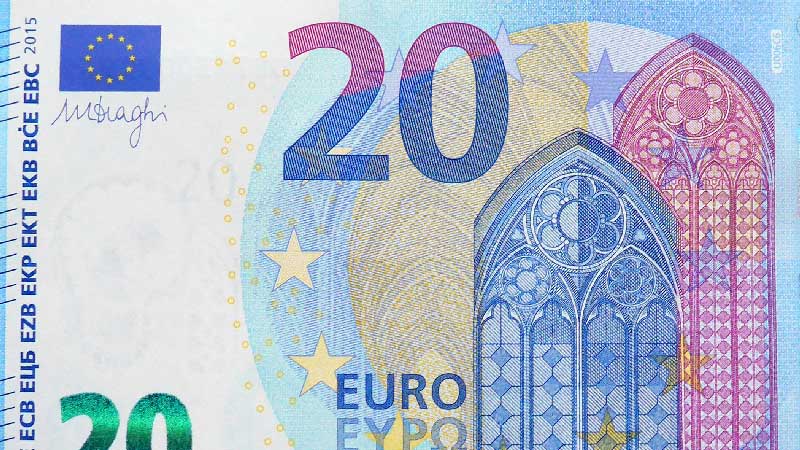Currency in Greece: EUR Send & Spend FX Guide
Resources for Expats, Travelers and Entrepreneurs Navigating Life and Trade in Greece with the Euro.

What's in this Greece currency guide?
What currency is used in Greece?
The official currency of Greece (country code: GR) is the Euro, with symbol € and currency code EUR.
What is a good Euro exchange rate?
The BestExchangeRates.com currency comparison table below helps you see the total cost of your currency transaction by showing the exchange rates offered by different providers. It also makes it easy to spot potential savings from market-leading FX services compared to bank rates.
To see a full list of rates, enter your transaction type, currencies and amount then click ‘GET RATES’:
Loading rates...
|
|
|
Good things to know about the Euro
As of June 16, 2025, the Euro (EUR) has experienced notable developments affecting travelers, expats, and business owners:
- Interest Rate Adjustments: The European Central Bank (ECB) has reduced its key interest rates multiple times since April 2025, with the deposit rate now at 2%. This easing cycle aims to stimulate economic growth amid global uncertainties. (ft.com)
- Inflation Trends: Eurozone inflation has moderated, with the latest data showing a decrease to 2.4% in November 2024, bringing it closer to the ECB's 2% target. (nbcdfw.com)
- Eurozone Expansion: Bulgaria is on track to adopt the euro on January 1, 2026, following successful convergence assessments. This expansion may influence currency dynamics and economic interactions within the euro area. (en.wikipedia.org)
These developments are crucial for individuals and businesses engaged in international transactions, as they can impact exchange rates, purchasing power, and overall economic conditions.
For more EUR information check out our selection of Euro news and guides.
Frequently Asked Questions
What currency should I use in Greece?
The domestic currency in Greece is the Euro.
What is the Euro currency code and symbol?
The three letter currency code for the Euro is EUR — symbol is €.
What does the Euro look like?
Here is an example Euro banknote:

Which countries use the Euro?
It is the domestic currency in Eurozone, Aaland Islands, Andorra, Austria, Belgium, Bulgaria, Croatia, Cyprus, Estonia, Finland, France, French Guinea, French Southern Territories, Germany, Greece, Guadeloupe, Vatican City, Ireland, Italy, Latvia, Lithuania, Luxembourg, Malta, Martinique, Mayotte, Monaco, Montenegro, Netherlands, Portugal, Reunion, Saint Barthelemy, Saint Martin, Saint Pierre and Miquelon, San Marino, Slovakia, Slovenia and Spain.
Is the Euro a closed currency?
No, the Euro is freely available and convertible. See guide: What is a closed currency?
What are equivalent amounts of AUD and EUR?
Here are some popular conversion amounts for AUD to EUR (Australian dollar to Euro)*.
*Converted at the current AUDEUR interbank exchange rate. Calculate actual payout amounts for Send Money and Travel Money exchange rates.
Travel money for Greece
Using Wise for Euro travel money is a smart choice for savvy travelers. With its competitive exchange rates and low fees, Wise allows you to convert and manage multiple currencies effortlessly.
Be careful when using your own bank's Debit/Credit Card, as your bank may also charge an extra 3% as an “Overseas Transaction Charge” plus “Overseas ATM” fees for withdrawing cash on top of the standard Visa/Mastercard 2.5% from market mid-rate.
For card purchases, if you are offered a choice of currencies always select to Pay in Euro otherwise you will typically get much worst dynamic currency conversion (DCC) exchange rates.
If you really want Euro cash before departure, you can save money by ordering online. You generally get better rates and can pick up the EUR cash locally or even on travel day at the airport.
Greece: Travel Guide
Traveling to Greece requires careful financial planning to ensure a smooth and cost-effective experience. Here's a comprehensive guide to help you navigate currency considerations and manage your money effectively during your visit.

Greece is a popular tourist destination known for its beautiful beaches, ancient ruins, and charming villages. The country has a well-developed tourism infrastructure, making it easy for visitors to get around and explore the many sights and experiences that it has to offer.
Getting around in Greece
The most popular way to travel around Greece is by car, as it allows for more flexibility and freedom to explore the country's many scenic roads and villages. Visitors can also take advantage of the well-developed public transportation system, including buses, trains, and ferries, which connect major cities and islands.

The island hopping is a popular way to explore Greece, as it has more than 6000 islands and islets, many of which are easily accessible by ferry. The most famous and popular islands are Santorini, Mykonos, and Crete, but there are many other islands that are worth visiting, such as the Cyclades, the Dodecanese, and the Ionian islands.
For those interested in history and culture, Greece has many ancient ruins and historical sites to explore, such as the Acropolis in Athens, the ancient city of Delphi, and the Palace of Knossos on Crete.
It's worth noting that during the high season, from June to September, the most popular destinations can be very crowded, and it can be hard to find accommodation and transportation. It's recommended to book in advance or to plan your trip during the shoulder or low season.
Overall, Greece is a great destination for travelers and offers a wide range of experiences, from beaches, island hopping, ancient ruins, history, and culture. With a good infrastructure and well-developed transportation system, it's easy to get around and explore the many sights and experiences that Greece has to offer.

Everyday Costs in in Greece
How much does it really cost to live, work, or travel in Greece? Here's what to expect for daily expenses and expat living.
Currency Guide for Greece (ISO code: GR)
For travelers planning a one-week mid-range stay in Greece, budgeting around €800 to €1,200 should provide a comfortable experience that includes various activities, meals, and some sightseeing. Here's a snapshot of typical daily expenses in the local currency (Euro, €):
- 🍽️ Meal at a local restaurant: €15–€25
- ☕ Coffee: €2.50–€4
- 🚍 Public transport fare: €1.40–€2.00
- 📱 Prepaid SIM card: €10–€20
- 🏨 Budget hotel or Airbnb: €50–€100 per night
In terms of affordability, Greece can be considered average compared to the cost of visiting the United States, where meal prices are typically higher and accommodation can be more expensive in major cities. In comparison to Australia, Greece generally offers lower prices on fresh produce and dining out, although rentals in tourist hotspots can rival those in cities like Sydney and Melbourne.
Living and Banking Tips for Expats in Greece
For expats living in Greece, monthly costs can range from €900 to €2,500 depending on lifestyle and location. Typical expenses include rentals, utilities, groceries, and transportation. For instance, a one-bedroom apartment in the city center might set you back around €400–€800, while utilities can tally up to around €150 per month.
When it comes to banking and card usage, it's advisable to use local banks as they often offer better exchange rates. Common international cards are widely accepted, but having some cash is useful, especially in rural areas. For sending and receiving money, online transfer services like Wise or OFX are popular among expats due to lower fees compared to traditional banks. You might find that exchanging money locally offers competitive rates, especially if you avoid airports and tourist traps. Always keep an eye on currency fluctuations to maximize your finances!
USD/EUR Market Data
The below interactive chart displays the USD/EUR change and UP📈 DOWN📉 trends over the past 1 Year.
Recent Euro Market News
February 5, 2026
Key Developments Affecting the Euro (EUR):
1. ECB Maintains Interest Rates Amid Economic Resilience: The European Central Bank (ECB) has kept its benchmark deposit rate at 2%, citing the eurozone's economic resilience despite global challenges. (apnews.com)
2. Eurozone Inflation Falls Below Target: Inflation in the eurozone dropped to 1.7% in January, below the ECB's 2% target, raising questions about potential future rate cuts. (exchangerates.org.uk)
3. Bulgaria Adopts the Euro: On January 1, 2026, Bulgaria became the 21st member of the eurozone, adopting the euro as its official currency. (en.wikipedia.org)
4. Euro Strength Impacts Export Competitiveness: The euro's appreciation against the US dollar has raised concerns about the competitiveness of European exports. (apnews.com)
Recent Developments in the Eurozone Economy:
- Europe's central bank maintains interest rate with economic growth resilient, Published on Thursday, February 05
- Europe sees modest growth, but the weaker US dollar looms as a threat, Published on Friday, January 30
For more EUR information read our News and guides to the Euro.
Send Money to Greece - Best Rates
To get a good (and fair) exchange rate when sending money to Greece you need to find and compare exchange rates for International Money Transfers (IMTs).
The available FX rates for sending money abroad can be very different to the mid-market (wholesale) rate which you see reported online and in the News.
You should especially compare your own bank's exchange rates to those available from Money Transfer specialists to see how much you can save - we make that calculation easy in the below table.
Get a better deal for foreign transfers to Greece
When sending money to Greece it’s important to compare your bank’s rates & fees with those we have negotiated with our partner money transfer providers. To get a better deal you should follow these 4 simple steps :
- Open an account with a BER reviewed FX provider (id docs may be required)
- You specify the local or Euro amount you want to transfer
- Make a local currency domestic transfer for the requested amount to the provider's bank account in your country
- Once your funds are received by the provider the converted EUR amount will be transfered to the recipient account you specify in Greece.
Use the above calculator to compare the exchange rates of FX specialist providers rates versus your bank's standard rates you can hopefully save around 5% and maybe more - end result is more Euro deposited into the recipient bank account and less margins and fees kept by the banks!
Managing money while living and working in Greece
Managing your money effectively while living and working abroad can be challenging, but there are several steps you can take to ensure that your finances are in order.
Understand Euro currency exchange rates: Exchange rates can have a big impact on your finances, so it is important to keep an eye on the EUR exchange rate and consider using a money transfer specialist or a credit card that does not charge foreign transaction fees to get the best exchange rate.
Use a local Euro bank account: A local EUR bank account can make it easier for you to manage your finances and pay bills while you are in Greece. It may also be more convenient to use a local EUR bank account to make purchases and withdraw cash.
Research local laws and regulations: It is important to understand the local laws and regulations that apply to financial transactions in Greece. This can help you avoid legal issues and ensure that you are complying with local requirements.
Consider the tax implications: It is important to understand the tax implications of living or doing business in Greece. This can help you plan your finances and ensure that you are paying the correct amount of tax.
Seek financial advice: If you are unsure of how to manage your finances in Greece, it is a good idea to seek the advice of a financial professional who is familiar with the local financial system. This can help you make informed decisions and avoid financial pitfalls.
We have put together some key points to help managing your money effectively, you can reduce financial stress and enjoy your experience living or doing business in Greece.
Is Greece cheap to live in?
Greece is generally considered to be relatively affordable to live in compared to other Western European countries. The cost of living in Greece can vary depending on location and lifestyle, but overall it's cheaper than most Western European countries.
Housing: The cost of housing in Greece is generally lower than in other Western European countries. Rent prices are lower, and it's possible to find affordable apartments in most cities and towns.
Food: The cost of food in Greece is also relatively low, especially when it comes to fresh produce. You can find fresh fruit and vegetables at a good price in local markets. Eating out at a traditional taverna can be relatively cheap, with a meal and a drink costing around €10-15.
Transportation: Public transportation in Greece can be relatively cheap, with a single bus or metro ride costing around €1.5. However, it's worth noting that the public transportation system in Greece is not as well-developed as in other Western European countries, particularly in rural areas.
Taxes: taxes in Greece can be relatively high, especially for those who are self-employed or run their own business.
Overall, the cost of living in Greece can be relatively low compared to other Western European countries, particularly for housing, food and transportation. However, it's worth noting that taxes can be relatively high, and the cost of living can vary depending on location and lifestyle.
Postcard from Greece

As the expat wanders through the winding streets of the Greek village, the sun beats down on their shoulders, casting long shadows on the whitewashed buildings. They pause in front of a cluster of apartments, the blue shutters and terracotta roof tiles a familiar sight. The expat takes a deep breath of the salty sea air and makes their way up the narrow stairs to their apartment, eager to rest after a long day of exploring.
